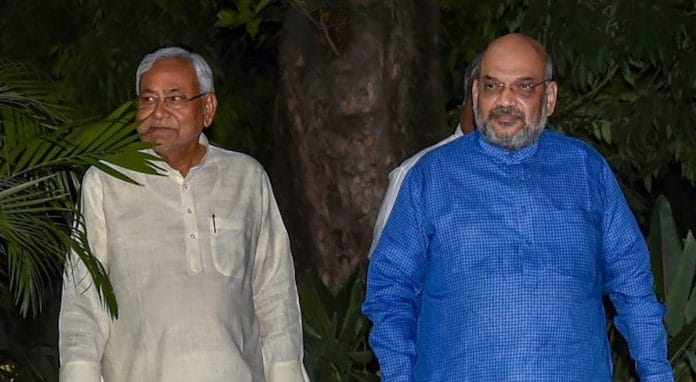It’s a sign of the times.
Bihar chief minister Nitish Kumar has done the impossible: He’s struck an honourable arrangement of equals with Amit Shah.
Since the Narendra Modi-led National Democratic Alliance (NDA) has come to power, Shah as party president has wielded a sharp knife for allies. Be it Shiv Sena in Maharashtra or the Peoples Democratic Party in Jammu & Kashmir or the Telugu Desam Party in Andhra Pradesh — the BJP has consistently let down its allies, even letting them feel humiliated and insecure. The BJP has come across as a party that seeks to end the dominance of regional parties in the states, making them all feel very insecure and vulnerable.
In 2014, the BJP won 22 of the 30 seats it contested in Bihar. Its allies won 9 of the rest 10. Nitish Kumar’s Janata Dal (United) won only two seats despite being the ruling party in the state. The ratio of seats between the BJP and the JD(U) comes to 1:11. But now, it has managed to make the BJP agree to a ratio of 1:1. They will likely contest 16-17 seats each. In other words, the BJP has effectively agreed to give up some of NDA’s sitting seats for the JD(U).
Also read: BJP & JD(U) to contest on equal number of seats for 2019 in Bihar, Nitish to be face of NDA
Modi-Shah are not known for such generosity, and to be fair, they haven’t needed it. They have been running the first single party-majority government in 30 years, and have been winning state after state since 2014. If they now feel the need to be generous towards a regional ally, it reflects the times. It tells you a lot about how the BJP sees its own prospects in the 2019 general elections.
1. The dipping narrative
The post-UP election high of the BJP gave way to the party losing its invincible image. Results in Gujarat and Karnataka and several by-polls confirmed the BJP’s monopoly over electoral victories could well be challenged. More importantly, the party hasn’t had a great 2018, embroiled in controversy after controversy, defending itself or going silent on key issues, unable to set the agenda. Be it Nirav Modi or Rafale deal, rural distress or the judiciary, M.J. Akbar or CBI, the BJP’s image of total control has given way to some disappointment.
It’s been possible for Nitish Kumar to use a somewhat weakened BJP to strike a good bargain for himself.
2. The BJP needs allies
If the BJP has so far behaved like an existential crisis for allies, it suddenly needs them. The announcement of contesting an equal number of seats with the JD(U) in Bihar is meant to be a signal for its NDA partners and potential new allies: Amit Shah can be nice when he needs to.
The chatter in political circles, the word on the street and the numbers in opinion polls all suggest the same: The BJP may not be able to win 272 seats on its own in 2019. Hence, the party needs to change its bully image with allies and not treat them as dispensable.
Also read: Rahul Gandhi let Nitish Kumar go into the BJP’s waiting arms—and wants him to stay there
The BJP can now use Nitish Kumar as a uniting figure for the NDA and for wooing new allies. This could be especially important after 2019 in case the BJP needs new allies.
3. Saving the heartland
A key turning point has been the prospect of a likely SP-BSP alliance in Uttar Pradesh. The UP alliance has guaranteed that the NDA will lose quite a few of its 73 seats in UP, making 272+ a difficult proposition for the BJP. It was thus important for the BJP to keep Nitish Kumar in good spirits. If Nitish Kumar quit the NDA again, it could have created the perception that the BJP is on a shaky ground not just in UP but across the Hindi heartland.
4. Prashant Kishor
The 1:1 deal between the BJP and the JD(U) was facilitated by JD(U) vice-president Prashant Kishor, who was a campaign strategist for Narendra Modi in 2014. Along with Nitish Kumar, the BJP also wants to use Kishor’s expertise in a limited way for its 2019 campaign. Kishor is still working as an adviser to Jagan Mohan Reddy in Andhra Pradesh and could help bring him on board for the NDA after 2019, if needed.
Also read: Strategist to Nitish Kumar’s right-hand man: What makes Prashant Kishor so special
Kishor advised Nitish Kumar to not subsume himself in the BJP just because he had no options left after switching over from the opposition to the NDA last year. Nitish Kumar then started making noises, exploring other options, and making it clear that he wouldn’t mind walking out even if he had to do it alone just like in 2014. Kishor also insisted that Amit Shah publicly announce the 1:1 formulation before the end of October, lest the BJP change its mind later.







Dear Moderator, Comments are taking forever to get displayed.
Shri Shekhar Gupta, whose political judgment I trust, said yesterday that Nitish Kumar is a brand to almost beat all others. That was certainly the case till quite recently. Especially after he stood the mandate of the people of Bihar on its head and given the mostly dispiriting news coming out of Bihar nowadays, CM Nitish Kumar’s core strength of being an honest man and a good administrator seems to wobble now. He has been reaching out to the opposition, to be rebuffed by the young but promising Tejaswi Yadav. Difficult to see him leading the coalition to an impressive victory.
The brilliance and flexibility of Amit Shah is for everyone to see and learn. Unfortunately Congress is displaying just opposite traits.